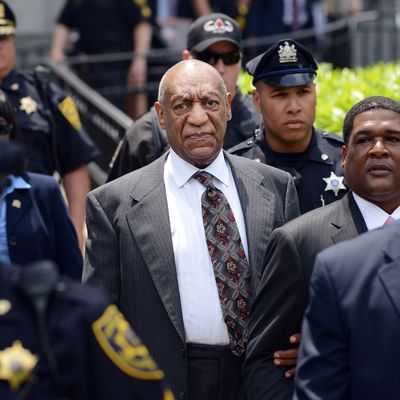
Andrea Constand went to police more than a decade ago with allegations that Bill Cosby, the comedian, “America’s Dad,” had given her three blue “herbal” pills at his Pennsylvania home. She took them, and became dizzy. Her legs felt like “jelly.” She started to panic; Cosby told her to lie down on the couch. She was in a haze, but felt Cosby penetrate her with his fingers. “I was unable to speak. I was like paralyzed,” she said, in 2005, about the incident, which allegedly happened the year before. Constand came to with her “bra askew.”
Cosby, at the time, told cops that he gave Constand Benadryl to help her sleep. Cosby said they “petted,” it was consensual, and he went to bed. The Montgomery County District Attorney, Bruce Castor (who ran again last year — but more on that later), declined to prosecute. Constand brought a civil suit against Cosby. Twelve other Jane Does made sworn statements about nonconsenual encounters they had with the comedian. The suit settled out of court for an unknown amount. Those Jane Does never testified in court, though some women did come out and identify themselves. Those women got little attention, and they were often met with scrutiny and even vitriol — a ripple that went quickly flat and faded out of public consciousness.
Fast-forward ten years, and Bill Cosby is going to go to trial for the very case that Montgomery County initially declined to prosecute. Since then, of course, close to 60 women have spoken out and said Cosby drugged them and sexually assaulted them, or tried to. Damning transcripts from Cosby’s deposition in Constand’s civil suit went public. In them, the comedian confessed to giving quaaludes to young woman to sleep with them. That helped push Montgomery County to start reexamining Constand’s complaint. Another factor was that the county D.A. race gained national attention when Kevin Steele launched a challenge against Castor last fall, making the latter’s refusal to bring charges against Cosby a central issue. Steele won, and in December of last year, just before the statute of limitations expired, charged Cosby with three counts of aggravated assault. At a preliminary hearing on Tuesday, police officers read aloud Andrea Constand’s 2005 report. That testimony, along with other evidence, led a Pennsylvania judge to say there’s enough to proceed with Constand’s case.
This is the first, and very likely to be the only, criminal trial Bill Cosby will face. The statute of limitations on most criminal and civil cases has long passed for most of the women — though Cosby faces a slew of civil litigation from other women who are suing for defamation. But symbolically, the Constand case is the day in court that so many others cannot have.
“I think it’s highly unlikely that this trial is going to be a he-said,” said attorney Gloria Allred, who represents many of Cosby’s accusers. “It’s going to be she said, she said, she said.” And that will likely be the biggest question that hangs over the Constand case: Will Cosby’s other accusers get the chance to testify? In Pennsylvania, bad-character evidence is not admissible in court, explains David Rudovsky, a law professor at the University of Pennsylvania. But there’s an exception to this rule, when “prior offenses can show a unique way of committing a particular crime.” Prosecutors will argue that Cosby’s misdeeds speak to a specific pattern: to give women drugs, and take advantage. “If you believe all these women were assaulted in the same fashion or similar fashion,” Rudovsky says, “that lends credence to what [Constand] is saying.”
But Rudovsky notes there is a danger in introducing other women’s stories, as Cosby remains uncharged in all those other instances. “Now you’ve got to litigate every one of those cases,” he says. “You could have several little trials going on when the main event is what this complainant is alleging.”
Allred believes at least some of these women will be heard in court. “I do believe there will be accusers who will be willing to testify under oath,” she said, “and endure what will certainly be a very vigorous and perhaps a brutal cross-examination.”
Cosby’s attorneys will fight, and hard, to bar women from testifying. (The admissibility of Cosby’s incriminating deposition, too, is likely to be a source of legal wrangling.) But even if no other women can speak, at least one will face that brutal and vigorous cross-examination: Andrea Constand. Constand did not need to testify at the preliminary hearing on Tuesday, but it’s almost certain she’ll testify in a trial. And here, Constand will face Cosby’s entire well-paid defense team, who will go at her with the kinds of questions that so many of the other women heard — or feared they’d hear if they came forward, and so chose silence instead. They are the kind of questions intended to sow doubt: Why did you wait so long? Why did you see Cosby again after it happened? “Her entire life will be subject to scrutiny because of these allegations,” said Stuart Slotnick, a former prosecutor and New York defense attorney.
The Constand case helped ignite the first public allegations against Cosby. It took a decade, and dozens and dozens of more women to speak out, but the claims made in 2005 are finally bringing the comedian to trial in 2016. Her story didn’t change; public opinion has.

